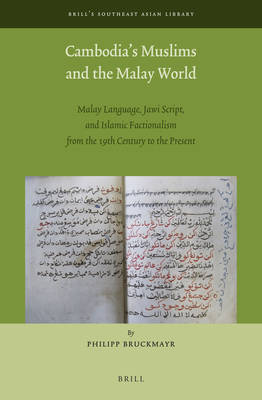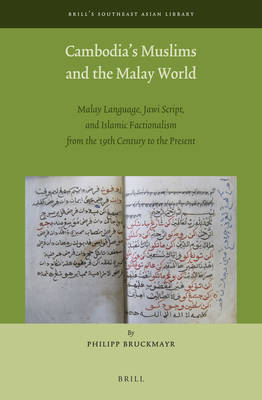
- Afhalen na 1 uur in een winkel met voorraad
- Gratis thuislevering in België vanaf € 30
- Ruim aanbod met 7 miljoen producten
- Afhalen na 1 uur in een winkel met voorraad
- Gratis thuislevering in België vanaf € 30
- Ruim aanbod met 7 miljoen producten
Zoeken
Cambodia's Muslims and the Malay World
Malay Language, Jawi Script, and Islamic Factionalism from the 19th Century to the Present
Philipp Bruckmayr
€ 201,45
+ 402 punten
Omschrijving
In this monograph Philipp Bruckmayr examines the development of Cambodia's Muslim minority from the mid-19th to the 21st century. During this period Cambodia's Cham and Chvea Muslims established strong relationships with Malay centers of Islamic learning in Patani, Kelantan and Mecca. During the 1970s to the early 1990s these longstanding relationships came to a sudden halt due to civil war and the systematic Khmer Rouge repression. Since the 1990s ties to the Malay world have been revived and new Islamic currents, including Salafism and Tablighism, have left their mark on contemporary Cambodian Islam. Bruckmayr traces how these dynamics resulted inter alia in a history of local Islamic factionalism, culminating in the eventual state recognition of two separate Islamic congregations in the late 1990s.
Specificaties
Betrokkenen
- Auteur(s):
- Uitgeverij:
Inhoud
- Aantal bladzijden:
- 428
- Taal:
- Engels
- Reeks:
- Reeksnummer:
- nr. 7
Eigenschappen
- Productcode (EAN):
- 9789004346055
- Verschijningsdatum:
- 13/12/2018
- Uitvoering:
- Hardcover
- Formaat:
- Genaaid
- Afmetingen:
- 160 mm x 236 mm
- Gewicht:
- 635 g

Alleen bij Standaard Boekhandel
+ 402 punten op je klantenkaart van Standaard Boekhandel
Beoordelingen
We publiceren alleen reviews die voldoen aan de voorwaarden voor reviews. Bekijk onze voorwaarden voor reviews.











